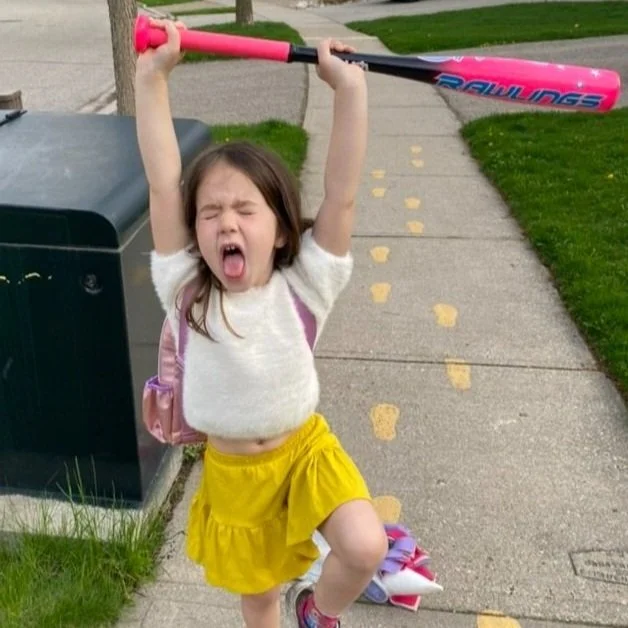It’s not about T-Ball: Lessons in courage, connection, & compassion.
Ready to roll: t-ball here we come.
This spring, my five-year-old signed up for t-ball.
She didn’t quite know what it was, just that her friends were doing it, and there were snacks at the end. That was enough. We practiced in the yard. We visited the field. She was excited. Confident. Ready to roll. (The proof is in the photo).
But the moment came, that moment when she had to leave my side.
And everything changed.
She froze. Her eyes teared up. Her little body curled inward as fear took over. “Please don’t make me go,” she whispered.
It was one of those moments as a parent where time slows down. I knew this wasn’t really about t-ball. It was about something deeper - uncertainty, vulnerability, transition.
And I knew I had to help her through it, not around it.
I’m incredibly lucky. In my work, I’ve had the privilege of collaborating closely with professionals across disciplines including behaviour analysts, psychotherapists, and other speech-language pathologists. At the clinic, we guide children (and families) through tough stuff with deep compassion, curiosity, and skill. And in that moment, on the grass next to a baseball diamond, I found myself pulling from every corner of that collective wisdom.
From Psychotherapy: The Power of Acceptance and Commitment
I leaned on the ACT (Acceptance and Commitment Therapy) framework, something I’ve grown to love through conversations with our clinic psychotherapists. We started with values.
After the first practice, we did a values exercise:
🧢 “What kind of teammate do you want to be?”
💬 “What would make you feel proud at the end of the game?”
She said, “I want to try my best. And I want to stay with my team. Because Clark's never give up.”
There it was. Her why.
Over the next few weeks, we practiced key ACT skills, like:
Acceptance: “It’s okay to feel nervous. It makes sense. Big things feel big.”
Cognitive Defusion: “That’s a worry thought. You don’t have to believe everything it says.”
Present Moment Awareness: “Feel the bat in your hands. Hear the birds. You’re right here, right now.”
Committed Action: “You told me you want to stay with your team, what’s one small step toward that?”
I’m so grateful for the language and lens that ACT gave me. It helped me step out of “fix-it” mode and into “sit-with-it” mode, holding space for both discomfort and growth.
From ABA: Shaping Skills with Clarity and Compassion
Our behaviour analysts remind me daily that behaviour can be communication, and that with the right supports, kids can build new skills even in the face of fear.
We broke it down.
Just like a well-crafted task analysis, we focused on small, achievable steps:
Walk to the baseball diamond.
High five the coach.
Pick up the bat.
Stand in the infield.
Each step was reinforced - at the game itself it was with praise or a quiet squeeze of my hand. We used pairing, prompting, and reinforcement, not to control her, but to support her through unfamiliar territory and difficult transitions.
We also added a simple visual checklist at home, inspired by our use of token systems and visual schedules:
Try your best
Cheer for a teammate
Catch a ball
Hit the ball
It wasn’t about points or perfection. Having a clear, visual reminder of what success could look like gave her structure and a sense of accomplishment.
From Speech-Language Pathology: The Language to Reflect, Regulate, and Repair
As an SLP, I’ve spent years supporting children in building communication, not just for asking and answering, but for connection and self-awareness.
When my daughter came off the field in tears, I didn’t rush to soothe it away. I used narrative language strategies I’ve seen work again and again:
“You were feeling really scared, and you still walked to the baseball diamond. That’s called being brave.”
Over time, we co-constructed new stories:
🗣 “Last time I was scared and I hit the ball anyway.”
🗣 “Today I cheered so loud my coach laughed!”
This storytelling didn’t just build language, it built identity. The story of a kid who shows up, even when it’s hard.
Why I’m So Grateful
I don’t know if my daughter will play t-ball next year. That’s not the point.
The point is: she learned something this season that has nothing to do with baseball.
She learned that fear is okay. That bravery isn’t loud or perfect. That you can have a hard moment and still belong.
And I, as a parent, as a clinician, and as someone lucky enough to work alongside brilliant, thoughtful people from multiple disciplines, learned (again) that the most meaningful growth doesn’t come from fixing or forcing.
It comes from connection.
From scaffolding.
From listening.
From showing up with curiosity and care.
Let’s be honest: it would’ve been easier to give up. To carry her off the field and call it a day. But in that hard moment, we found a chance to build something deeper - resilience.
Because the wins we’re chasing aren’t about runs or home plates.
They’re about showing up.
Trying again.
And growing through it.
We’re still swinging. ⚾

